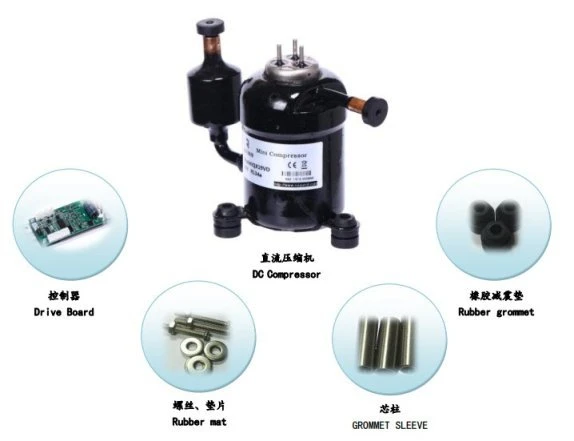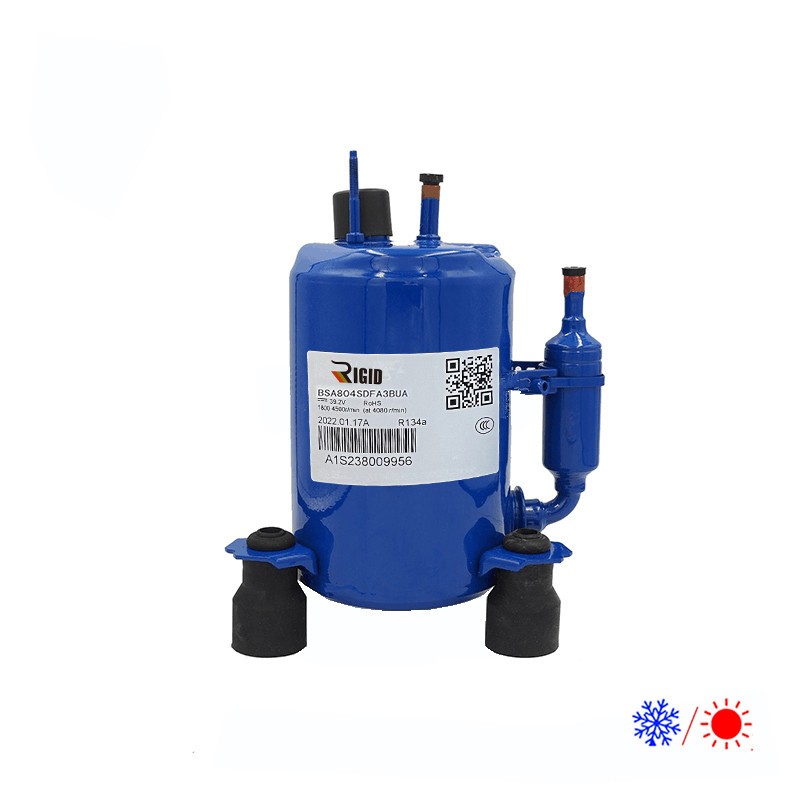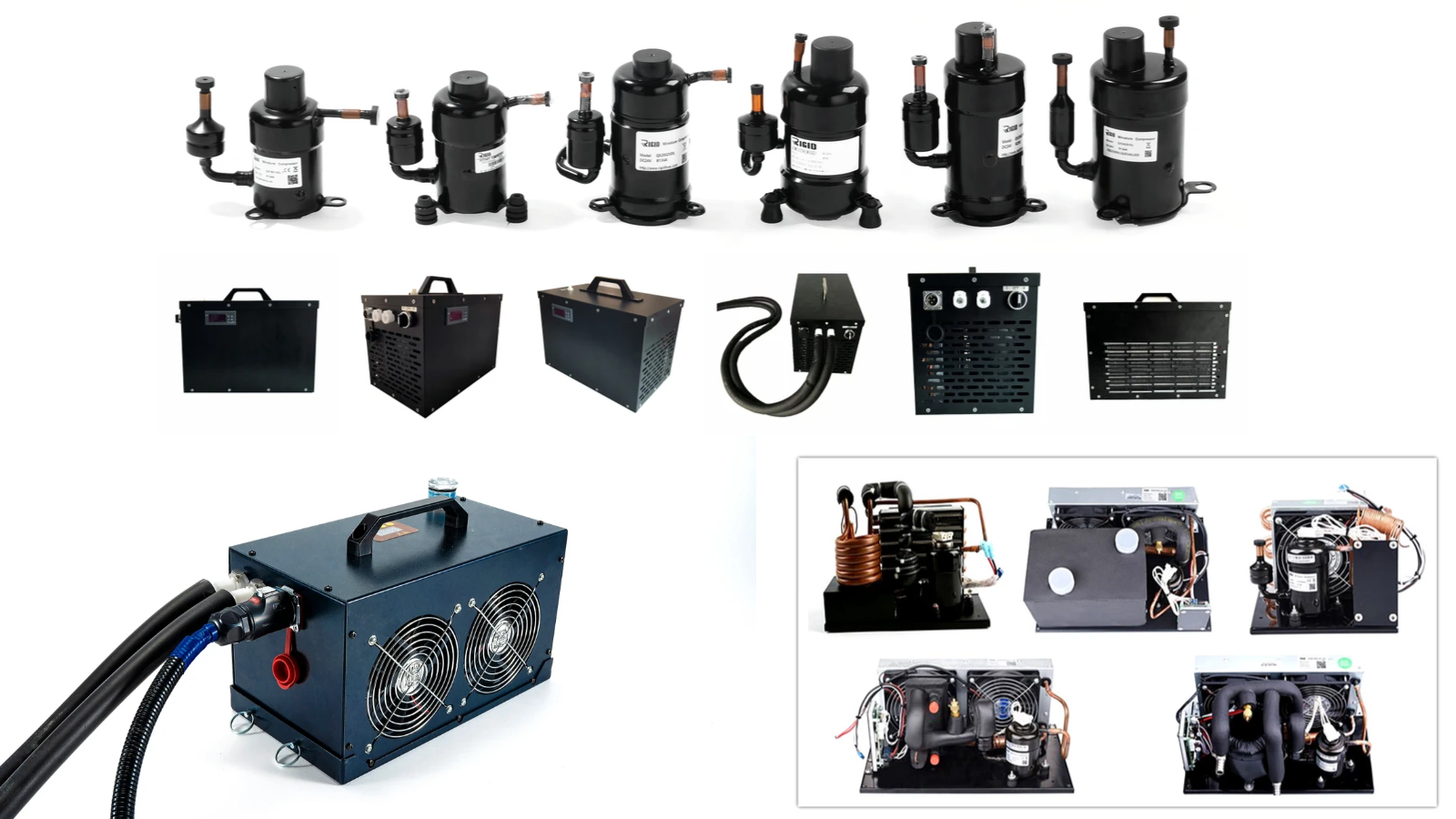Introduction

"RIGID is a miniature refrigerated compressor innovation leader in China. We keep looking for novel solutions in compact and portable cooling systems. We capture new technologies in mobile and compact cooling systems."
In the ever-evolving world of HVAC systems, understanding the nuances of different compressor types can feel like navigating a labyrinth. One of the standout players in this arena is the scroll compressor, known for its efficiency and reliability. But what exactly is a scroll compressor? This introduction will explore why choosing a scroll compressor can be advantageous for your HVAC needs and how RIGID stands out in providing superior cooling solutions.
Understanding Scroll Compressors
A scroll compressor operates using two spiral-shaped elements that compress refrigerant as they move together. This design allows for continuous compression with minimal pulsation, making it quieter and more efficient than traditional compressors. When asking What is the difference between piston and scroll AC compressors? it’s essential to note that while piston compressors use reciprocating motion, scroll compressors rely on an innovative spiral mechanism that enhances performance.
Why Choose Scroll for HVAC Systems
When you're in the market for an HVAC system, you might wonder which compressor is better: scroll or rotary? Scroll compressors are often favored due to their compact size, lower noise levels, and energy efficiency—making them ideal for residential settings where comfort is key. Additionally, they have fewer moving parts compared to rotary designs, which translates to reduced wear and tear over time.
The RIGID Advantage in Cooling
RIGID has carved out a niche by integrating advanced technology into its scroll compressors, ensuring optimal performance even under demanding conditions. Customers frequently ask if are scroll air compressors good?—with RIGID’s products consistently receiving high marks for reliability and efficiency. By choosing RIGID's cooling solutions, you not only benefit from superior technology but also enjoy peace of mind knowing you're investing in a product designed to last.
What is a Scroll Compressor?

When diving into the world of HVAC systems, one might stumble upon the term scroll compressor. But what exactly is a scroll compressor? In essence, it's a type of positive displacement compressor that utilizes two spiral-shaped scrolls to compress refrigerant gas. This unique design allows for efficient and reliable operation, making it a popular choice in various air conditioning applications.
Definition and Functionality
A scroll compressor consists of two interleaved spiral scrolls: one stationary and one orbiting around it. The function of these scrolls is to trap refrigerant gas in pockets as they move, compressing it gradually until it reaches the desired pressure. This mechanism not only ensures smooth operation but also minimizes vibrations and noise—a definite perk when considering which compressor is better for your needs.
How It Works in Air Conditioning
In air conditioning systems, the scroll compressor plays a pivotal role in maintaining comfortable indoor temperatures. As the refrigerant enters the compressor, it's drawn into the space between the two scrolls where it's compressed by their motion. This process generates high-pressure gas that then flows to the condenser, allowing for effective heat exchange and cooling—a crucial step in understanding what is a scroll compressor's contribution to HVAC efficiency.
Benefits Over Other Compressors
Now you might wonder, what sets this type of compressor apart from others? One significant advantage of using a scroll compressor over alternatives like rotary or piston compressors lies in its energy efficiency; they typically consume less power while delivering comparable performance. Additionally, they have fewer moving parts than piston compressors, resulting in lower maintenance costs—definitely something to consider when weighing the disadvantages of a scroll air compressor against its benefits.
Scroll vs. Rotary: Which is Better?

Key Features of Each Compressor
A scroll compressor is known for its simplicity and reliability, utilizing two spiral-shaped scrolls to compress refrigerant efficiently. This design minimizes moving parts, leading to lower noise levels and reduced vibrations compared to traditional compressors. In contrast, rotary compressors use a rotating mechanism with vanes or rollers that create compression through centrifugal force, making them compact and lightweight.
Both compressors offer distinct advantages; for instance, the scroll compressor typically boasts higher efficiency rates and quieter operation, while the rotary compressor excels in smaller applications where space is at a premium. If you're wondering what is a scroll compressor? It's essentially designed for optimal energy efficiency in HVAC systems. Meanwhile, rotary compressors are often favored in portable air conditioning units due to their lightweight design.
In terms of durability, scroll compressors generally have a longer lifespan thanks to fewer moving parts which translates into less wear and tear over time. However, rotary compressors can be more cost-effective upfront due to their simpler manufacturing process.
Performance Comparison
When comparing performance metrics between these two types—scroll vs. rotary—the differences can be quite telling. Scroll compressors tend to provide consistent cooling output with less fluctuation in temperature control; this makes them ideal for larger HVAC systems needing steady performance over time. On the other hand, rotary compressors may struggle with maintaining stable temperatures under heavy loads but can perform admirably in smaller-scale applications.
In terms of energy consumption, scroll compressors usually edge out their rotary counterparts due to their efficient design that minimizes energy loss during operation. If you're asking yourself which compressor is better—scroll or rotary? The answer often hinges on your specific needs: if you prioritize long-term efficiency and quiet operation, go with a scroll; if you need something compact for tight spaces or temporary setups, consider going with a rotary unit.
It's also worth mentioning that while both types have their merits regarding cooling efficiency and operational costs, the longevity and maintenance requirements differ significantly as well—scrolls typically require less frequent servicing than rotaries.
Ideal Applications for Both
So where should you use each type? Scroll compressors shine brightest in commercial HVAC systems or large residential settings where reliability and energy efficiency are paramount concerns—think central air conditioning units or chillers used in refrigeration setups. Their ability to deliver consistent performance makes them an excellent choice when dealing with varying load conditions.
Conversely, if you're looking at portable air conditioning solutions or applications requiring space-saving designs like window units or small refrigeration tasks—this is where the rotary compressor comes into play! They are ideal for scenarios where weight limitations matter most without compromising too much on cooling capability.
In summary, understanding what is the difference between piston and scroll AC compressor helps clarify further distinctions within this realm as well; however, when it comes down specifically to scroll vs. rotary options—the right choice largely depends on your application needs!
Scroll and Screw Compressors Explained

When it comes to understanding the differences between scroll and screw compressors, it's essential to delve into their mechanisms and design features. While both types serve similar purposes in HVAC systems, their operational principles set them apart. A scroll compressor relies on two spiral elements to compress refrigerant, whereas a screw compressor utilizes two interlocking rotors for the same task. This fundamental difference influences everything from efficiency to maintenance requirements.
Differences in Mechanism and Design
So, what is the difference between a scroll and screw compressor? The design of a scroll compressor is relatively simple, consisting of fixed and moving spirals that create compression as they orbit around each other. In contrast, a screw compressor has two helical rotors that rotate in opposite directions, compressing air or refrigerant as it moves through the unit. This distinction leads to varying levels of complexity; while scroll compressors are easier to manufacture and maintain, screw compressors typically offer higher capacities for industrial applications.
Efficiency Considerations
When evaluating which compressor is better—scroll or rotary—efficiency often takes center stage. Scroll compressors generally provide superior energy efficiency due to their continuous compression process with minimal moving parts; this results in less energy loss during operation. However, screw compressors can also be efficient at larger scales where high-volume output is necessary but may not match the efficiency ratings of their scroll counterparts on smaller systems.
Applications for Scroll and Screw Compressors
When considering applications for these technologies, it's crucial to recognize where each excels. Scroll compressors are ideal for residential air conditioning systems due to their compact size and quiet operation—definitely a plus when cooling your home! On the other hand, screw compressors shine in large commercial settings where high-capacity cooling or heating is required; they’re often found in industrial refrigeration systems or large HVAC setups requiring robust performance.
Disadvantages of Scroll Air Compressors

While scroll compressors are often praised for their efficiency and reliability, they do have their share of drawbacks. Understanding these limitations can help you make an informed decision when considering whether to invest in a scroll compressor. Let’s delve into the common limitations, maintenance challenges, and cost considerations associated with these units.
Common Limitations
One of the most notable disadvantages of a scroll air compressor is its sensitivity to certain operating conditions. Unlike piston or rotary compressors, scroll compressors may struggle with extreme temperatures or high humidity levels, which can affect their performance significantly. Additionally, while they excel in many applications, there are scenarios where other types of compressors might outperform them—particularly in heavy-duty industrial settings.
Another limitation is that scroll compressors generally have a lower capacity range compared to screw compressors. This means that for larger facilities requiring massive cooling power, a scroll compressor might not be the best fit. So when asking What is the disadvantage of a scroll air compressor?, it often boils down to their capacity constraints and performance under varying conditions.
Maintenance Challenges
When it comes to maintenance challenges, scroll air compressors require specific attention that can sometimes pose issues for users unfamiliar with their design. For instance, while they typically have fewer moving parts than piston models—which means less wear and tear—they can still suffer from issues like refrigerant leaks if not properly maintained. This could lead to costly repairs down the line if users are unaware of how to troubleshoot common problems associated with these units.
Moreover, accessing certain components for routine checks or repairs can be trickier compared to more traditional designs like rotary or piston compressors. This complexity can lead to longer downtime during maintenance procedures if technicians aren’t well-versed in working specifically with what is a scroll compressor? Therefore, potential buyers should weigh this aspect seriously against the advantages offered by these efficient machines.
Cost Considerations
Cost is always a significant factor when choosing between different HVAC systems; thus it's crucial to consider how much you’re willing to invest upfront versus long-term savings on energy bills and maintenance costs. Scroll compressors tend to have higher initial purchase prices compared to rotary models due to their advanced technology and manufacturing processes. While they promise energy efficiency—leading many people wondering “Are scroll air compressors good?”—the higher initial outlay may not align with everyone's budgetary constraints.
Additionally, specialized parts for repair or replacement may also come at a premium price point since they aren't as widely available as those for more traditional compressor types like pistons or screws. Thus, potential buyers should thoroughly evaluate both short-term expenses and long-term benefits before making any decisions about which compressor is better: scroll or rotary? Balancing cost against performance will ultimately guide you toward the right choice for your needs.
Are Scroll Air Compressors Worth It?

When considering whether scroll air compressors are good investments, it’s essential to dissect their advantages and drawbacks. With energy efficiency taking center stage in today’s HVAC discussions, many homeowners and businesses are evaluating if these compressors can deliver on their promises. So, let’s dive into the specifics of what makes scroll compressors tick and whether they truly stand out in a crowded marketplace.
Advantages in Energy Efficiency
One of the primary reasons people ask, What is a scroll compressor? is due to its impressive energy efficiency. Scroll compressors utilize a unique mechanism that allows for continuous compression without the start-stop cycles typical of piston models. This results in lower energy consumption and reduced operating costs, making them an attractive option for those looking to save on utility bills.
Moreover, when comparing scroll versus rotary options, many users find that scroll compressors often outperform rotary types in terms of energy savings during operation. Their design minimizes friction and maximizes output, allowing them to maintain optimal performance even under varying load conditions. This efficiency translates directly into significant savings over time—something every homeowner appreciates!
Real-World Performance Insights
So, are scroll air compressors good? The answer lies in real-world applications where they have proven their worth time and again. Users frequently report enhanced cooling capabilities and quieter operations compared to traditional piston models or even rotary systems. In fact, many HVAC professionals recommend them for both residential and commercial settings due to their reliability and performance.
Furthermore, when exploring which compressor is better—scroll or rotary—it becomes clear from user testimonials that scroll models often provide more consistent cooling with fewer fluctuations in temperature control. This stability is particularly beneficial for environments requiring precise climate control such as server rooms or laboratories. In essence, real-world performance insights suggest that investing in a quality scroll compressor can yield substantial benefits.
Customer Satisfaction with RIGID Products
Customer satisfaction plays a pivotal role when determining the worth of any product—and RIGID's line of scroll air compressors does not disappoint! Users consistently highlight their durability, ease of installation, and exceptional service support as key factors driving their positive experiences with RIGID products. It's no wonder that many customers feel confident recommending these units over others available on the market.
Additionally, feedback regarding RIGID's commitment to innovation reinforces why so many choose this brand when asking about the difference between piston and scroll AC compressors or wanting clarity on what sets them apart from screw designs as well. Customers appreciate not only the superior technology but also how it translates into tangible benefits like lower energy costs and higher efficiency ratings—all while enjoying peace of mind knowing they made a smart choice.
In summary, while no system is without its disadvantages (and yes—there are some limitations), it seems clear that the advantages offered by RIGID's scroll air compressors make them well worth considering for anyone seeking reliable HVAC solutions.
Conclusion

As we wrap up our exploration of scroll compressors, it's essential to consider your specific needs and the context in which you’ll be using them. The question of Which compressor is better, scroll or rotary? often arises, but the answer depends on your priorities—be it energy efficiency, noise levels, or maintenance requirements. Ultimately, choosing the right compressor for you will hinge on understanding what is a scroll compressor and how it fits into your HVAC system.
Choosing the Right Compressor for You
When deciding between a scroll compressor and its counterparts like rotary or screw compressors, it's crucial to weigh their respective advantages and disadvantages. For instance, while scroll compressors are known for their efficiency and quiet operation, they do come with some limitations; understanding what is the disadvantage of a scroll air compressor can help you make an informed choice. Additionally, if you're wondering about the difference between piston and scroll AC compressors, this knowledge can further guide your decision-making process.
How RIGID Leads in Innovation
RIGID has made significant strides in the HVAC industry by focusing on innovation tailored to meet customer demands. Their commitment to developing advanced technologies ensures that their scroll compressors remain at the forefront of energy efficiency and performance—qualities that set them apart from competitors. With RIGID's expertise in creating reliable systems that maximize comfort while minimizing costs, choosing their products means investing in long-term satisfaction.
Recap of Scroll Compressor Benefits
In summary, scroll compressors offer unique advantages that make them an attractive option for many applications. They excel in energy efficiency compared to other types like rotary or screw compressors while providing quieter operation—a significant plus for residential settings. As we've discussed throughout this guide, understanding what is a scroll compressor can empower you to make an educated decision when selecting equipment for your HVAC needs.